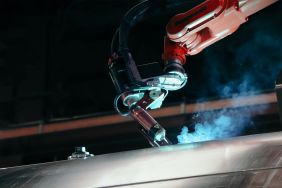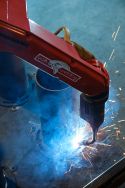
As long as parts fit perfectly together, gas cap and wire searching (Quick-Touch) are sufficient to measure deviations in the position of the weld seam so that the robot can automatically adjust it in the welding program. However, with V-, I- and raised welds, irregular pre-openings and deformations due to shrinkage or heat input, it becomes a lot more difficult and sometimes even impossible to weld these welds with the welding robot. Use of the welding robot in such cases is still no match for the speed and flexibility of an experienced manual welder. The ARC-EYE Adaptive plug-in that Valk Welding developed for its ARC-EYE CSS welding seam tracking system now changes this.
ARC-EYE CSS is a laser sensor system, mounted on the robotic welding torch that registers deviations in the position of the weld seam during welding and corrects them in real time. This eliminates the need for manual program corrections and increases process speed. With the ARC-EYE Adaptive plug-in, the ARC-EYE CSS can now also be used to correct welds with larger tolerances in real time. Therefore, workpieces that could previously only be welded manually can now be welded on the robot thanks to this development.
ARC-EYE Adaptive plug-in recognises the geometry
Due to an irregular pre-opening, a deviant weld seam preparation or distortion caused by the welding process itself, the geometry of the weld seam (seam shape) can deviate. A small geometric deviation can quickly lead to a volume deviation of 40% to 80%. So this means that much more welding material is needed and most likely a different way of welding is needed. With the adaptive plug-in, the ARC-EYE CSS laser sensor also recognises the seam shape and automatically adjusts the welding current, welding voltage, welding speed and weaving movement in the welding program accordingly. Workpieces with larger and irregular tolerances can thus now be welded robotically. In practice, this means that suppliers and OEMs can guarantee higher consistent "robotic quality" to their customers.
Real-Time Adaptive Multi-Layer
For deviations of a few millimetres, the welding volume can easily double.
With such differences in geometry, Real-Time Adaptive Multi-Layer can automatically accommodate this volume difference.
Real-Time Adaptive Seam Mapping.
When during multi-layer welding the volume differs per layer, it is necessary to distribute the welds differently per layer. Therefore, it may be necessary to use a different welding strategy per layer. For this scenario, engineers at Valk Welding are now working on Adaptive Seam Mapping in which each weld, layer by layer, is automatically calculated and generated. During or after the root seam, the ARC-EYE scans the seam shape and uses this data to calculate the best-fitting weld distribution. This calculation then considers the varying weld volume and minimum/maximum allowable heat input per weld.
ARC-EYE CSS:
Practical example of welding crane booms
At the German company KSK Vlassenroot, which manufactures, among other things, the crane booms for Liebherr cranes, very strict requirements are placed on the welding due to the high forces on the crane booms. Because the assemblies are made of cast and rolled steel the gaps never close 100%, until recently they were exclusively welded by hand. When KSK Vlassenroot could weld the crane booms robotically, the supplier could guarantee a higher and constant welding quality. Thanks to the deployment of ARC-EYE CSS and the Adaptive plug-in, these crane booms are now successfully welded on Valk Welding welding robots. Meanwhile, more customers require that other parts are also welded in this way.

Valk Welding develops and builds complete system solutions based on Panasonic welding arc robots in combination with the by Valk Welding developed pneumatic shock sensor, calibration, robot torches, welding seam monitoring systems, Easy Programming software and welding wire. All components are perfectly geared to each other and communicate 1 on 1 with the robot controls. Valk Welding thus delivers complete systems from under one roof, so that customers have just one single point of contact for the whole system and it’s performance.

Valk Welding would like to inform you about an exciting change within our company. In order to emphasise our welding wire services even more, we now present our welding wire department as the Welding Wire Service Centre. This includes all our well-known welding wire services and is run by our trusted team of Valk Welding wire experts.
What does this mean for you?
Fortunately, this change has no impact on the quality of our products and the service you have come to expect from us. Our website will remain in use, we will proudly present the connection with Valk Welding and there will be no further changes for you. However, please note that from now on we will be using a new email address: wwsc@valkwelding.com.
Why a service centre?
In today’s dynamic production landscape, it is increasingly challenging to match the logistics and stocks of wire manufacturers with your daily welding wire consumption. Our Welding Wire Service Centre acts as the missing link: we hold stocks and provide logistical services.
What makes us a service centre?
Our welding wire department has been providing scheduled and flexible deliveries of various welding wires directly from large stocks since 1984. We take care of quality and logistics without the involvement of third parties, so you can enjoy reliable and fast deliveries from centrally located distribution centres.
Contact us
If you have any questions or require further information, please do not hesitate to contact us at wwsc@valkwelding.com or +31 78 69 170 11.
We would like to thank you for your support and trust in Valk Welding, and we look forward to continuing all our welding wire partnerships under the name of the Welding Wire Service Centre.

Kumatech, a rapidly growing scale-up focused on being the “best buy AGVs and total solutions for internal logistics ”, has received the first RWAAS solution from Valk Welding. RWAAS stands for Robot Welding As A Service and offers a unique all-in service package from Valk Welding. For a predictable monthly fee, you have a welding robot system in production without any investment or an intensive long process. This includes all wear parts and even unlimited welding wire for the RWAAS robot system. The RWAAS robot system was delivered to Kumatech in the morning and was in production by the afternoon.
Why did Kumatech choose RWAAS?
Kumatech chose RWAAS instead of investing in purchasing a welding robot. The decision for RWAAS was made due to the company's rapid growth, optimising financial resources in this way. Within one day, the RWAAS solution was operational, allowing the company to continue its production and growth.
Upon signing up for RWAAS, Kumatech also gained access to the ARP powered by ArcNc software, which enables automatic robot programming. Thanks to the ARP powered by ArcNC software, programming a welding robot has been reduced from several hours to just 15 minutes. This is a significant time difference compared to traditional programming. Additionally, this concept offers a perfect trial period to later invest in purchasing their own welding robot, aiming to grow with the same team and invest in smart automation.
Advantages of the robot
The welding robot does not replace people but allows Kumatech to focus on more challenging tasks. Two employees, Joep and Teun, have completed operator and ArcNC training and can now fully program and operate the robot. By investing in RWAAS, Kumatech can quickly respond to small market demands and is not dependent on suppliers or finding manual welders.
Future vision
Kumatech strives for the “best buy” AGVs and is very cost-conscious with production resources. In the long term, they want to integrate more intelligence into the welding robot to ensure the company's quality and performance. Machine learning and artificial intelligence are no longer trends but essential parts of their strategy. ARP powered by ArcNC is a key element in this.
Kumatech looks forward to the next step of ARP powered by ArcNC, where small design changes and different product variants will be automatically recognised, analysed, and programmed without human interaction. They are pleased that Valk Welding is the first to bring this comprehensive concept to the market, which will help many companies take a significant step forward.

Trailer builders can expect to cut production costs and maximise efficiency following a new partnership between Netherlands-based automation company, Valk Welding, and ArcNC, a software provider in Belgium.
Thee trailer manufacturing industry has proven to be especially resilient in recent years amid somewhat challenging economic conditions.
As the freight task continues to grow, so too does demand for higher productivity heavy vehicles and trailing equipment. For some OEMs, the financial constraints of innovation and labour can affect a business’s bottom line and so a decision must be made – do you invest in people or invest in technology? It is a paradoxical situation – you need a workforce to design and produce yet you need access to state-of-the-art equipment to remain competitive.
Fortunately, Valk Welding has the answer to this conundrum.
ARP, powered by ArcNC, is a groundbreaking collaboration between Valk Welding and ArcNC. Although ArcNC is focused on the general industry, the software has become incredibly user-friendly for trailer manufacturing, thanks to input and questions from numerous trailer manufacturers. This partnership leverages the strengths of both companies to offer trailer manufacturers a unique opportunity to drastically reduce production costs using welding robots, while still providing the flexibility to meet individual customer requirements. Notably, ARP powered by ArcNC is fully adapted to the unique and high performance of the Panasonic welding robots. The advantages of a real welding robot, compared with general robot arms, are significant when it comes to arc welding.
Valk Welding has been a key player in the trailer manufacturing sector for years. With a strong focus on arc welding and a deep understanding of the industry’s needs, Valk Welding has consistently delivered high-quality robotic solutions that enhance production efficiency and quality. Their expertise in welding automation is unparalleled, making them a trusted partner for many trailer manufacturers. Valk Welding’s very close relationship with Panasonic has spanned more than 35 years, underscoring its commitment to using only the best welding robots.
ArcNC, on the other hand, brings cutting-edge technology and innovation to the table with advanced software solutions that complement Valk Welding’s robotic systems, creating a seamless integration that maximises productivity and flexibility.
The ARP powered by ArcNC system is designed to offer several key benefits:
- Cost Reduction: By automating the welding process, trailer manufacturers can significantly reduce labour costs and increase production efficiency. This is particularly crucial in an economic downturn, where every penny counts.
- Flexibility: Despite the automation, the system allows a high degree of customisation. Trailer manufacturers can easily adapt the production process to meet specific customer requirements, ensuring that each trailer is tailor-made to perfection.
- Quality Assurance: Valk Welding’s expertise in arc welding ensures that the highest quality standards are maintained throughout the production process. This is essential for building durable and reliable trailers that meet industry standards.
- Scalability: The ARP system is scalable, allowing trailer manufacturers to expand their production capabilities as needed. This flexibility is vital for adapting to market demands and staying competitive.
In addition to these benefits, the development of a Management Information System, is also a key advancement for real-time performance and quality control. This MIS is a special in-house development by Valk Welding, enabling trailer manufacturers to monitor and register every aspect of the production process, ensuring optimal use of manufacturing resources. The system provides valuable insights into production efficiency, helps identify areas for improvement, and ensures that quality standards are consistently met.
The ARP powered by ArcNC system represents a significant advancement for the trailer manufacturing industry. By combining cost reduction with flexibility, quality assurance, and real-time performance monitoring with the Valk Welding MIS software, this innovative solution empowers trailer manufacturers to navigate the current economic challenges while meeting the evolving demands of their customers.
Valk Welding and ArcNC’s collaboration is a testament to the power of innovation and partnership in driving industry transformation.
Valk Welding develops and builds turnkey welding robot systems for small to medium production requirements and is your partner in all welding accessoiries.
Valk Welding is a proud and innovative family-owned company with over 60 years of experience in welding technology. As a leading total supplier of 'all-in-one' welding robot systems, we enable efficient high-mix, low-volume production for the metalworking industry. In both Europe and beyond, our employees work every day to create strong, reliable connections throughout the entire chain.
Plan your visit to the trade fair!

